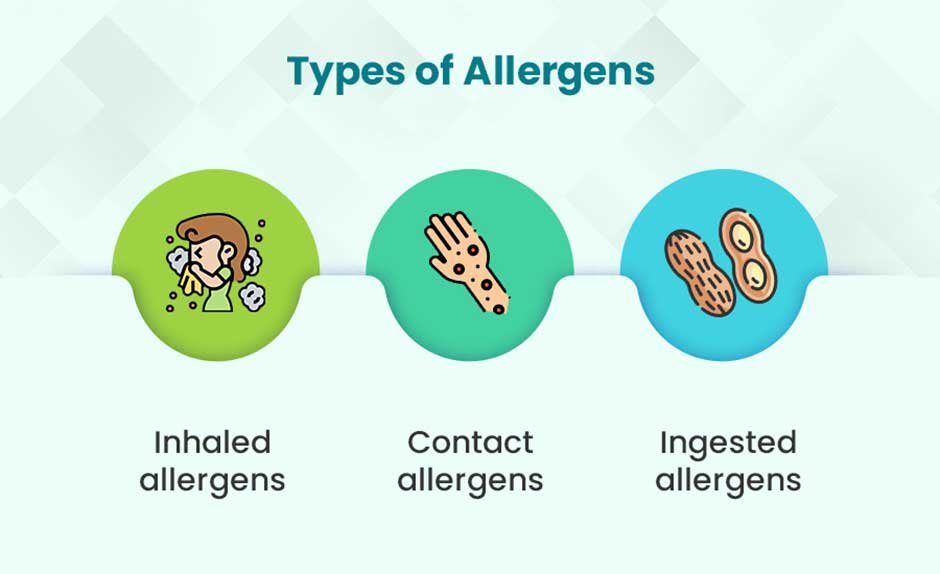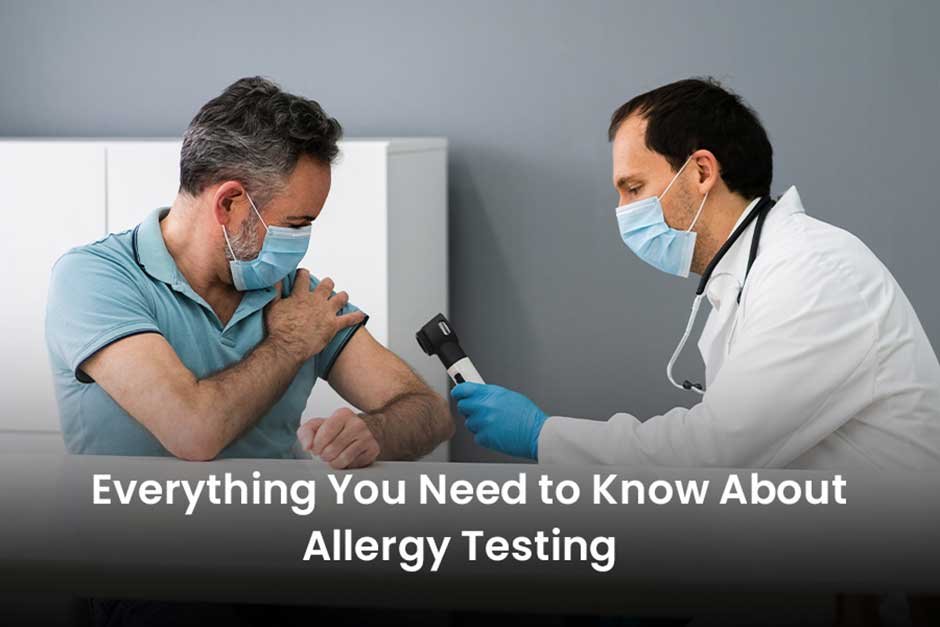Allergies occur when our body’s immune system reacts to something it perceives as a threat. These threats, also known as allergens, can set off different reactions, ranging from minor sneezing to severe swelling. The allergic reaction depends on how our immune system reacts. Over 100 million Americans deal with some kind of allergies every year, as estimated by the Asthma and Allergy Foundation of America.
Individuals suspecting allergic reactions should immediately consult a physician and get tested to figure out the underlying cause of the problem. The treatment options usually vary depending on the specific allergen involved and how severe the symptoms are. In this blog post, we will share a detailed understanding of allergens, how they cause allergic reactions, the tests for allergies, and how allergy testing is done. Read on to learn more.
Types of Allergens

Allergens are foreign substances that can cause an allergic reaction. There are three main types of allergens which are as follows:
- Inhaled allergens
These airborne allergens can trigger allergic reactions when they come into contact with the respiratory system. Pollens, dust mites, pet dander, mold spores, etc. Are some of the most common inhaled allergens.
- Ingested allergens
There are some substances present in certain foods, which may trigger allergic reactions if ingested. A few types of nuts like peanuts, pine nuts, etc., shellfish like prawn, eggs, soy, etc. Are some of the most common ingested allergens.
- Contact allergens
Certain substances can cause an allergic reaction when they come in contact with the skin. Poison ivy, oak, sumac, latex, nickel, fragrances, etc. are considered some of the most common contact allergens.
Primary care physicians typically recommend two types of tests to identify the type of allergen involved- a skin test and a blood test.
Types of Allergy Testing

1. Skin tests
During any type of skin test procedure, first, the healthcare providers sterilize the skin and mark it with a grid for accurate results. Then, they apply the suspected allergens to the skin for monitoring any possible allergic reactions, such as redness, swelling, or itching.
There are three types of skin tests for allergies which are as follows:
- Scratch or Prick test
During a scratch test, healthcare professionals put a small drop of the allergen on the skin and use a needle to scratch or prick the skin to introduce the allergen to the skin’s surface. Then they monitor the skin for a reaction, which typically occurs within 15-20 minutes. This test is usually recommended to identify allergies to pollen, dust, pet dander, and certain foods.
- Intradermal test
During the intradermal test, a small amount of the allergen is injected into the skin using a fine needle. Primary care physicians recommend this type of skin test when the scratch or prick test result is inconclusive. This test is also used for identifying allergies to medications, insect stings, and certain foods.
- Patch test
During this procedure, healthcare professionals put the suspected allergen on a patch, apply it to the skin and wait for 48 hours. Then they monitor the skin for any delayed reactions that may occur within 48-72 hours. Patch tests are most frequently used to identify allergies to metals, fragrances, etc.
2. Blood tests
In blood tests, a healthcare professional measures the levels of specific antibodies in the blood, which can possibly indicate an allergic reaction. It is generally less sensitive than skin tests but less reliable for diagnosing allergies. However, providers usually recommend blood tests for individuals who cannot undergo skin testing or those taking medications that interfere with skin testing.
The two primary types of blood tests are as follows:
- Enzyme-Linked Immunosorbent Assay (ELISA) test
Primary care physicians recommend the ELISA test to detect the immunoglobulin E (IgE) antibodies levels in the blood. Elevated levels of IgE antibodies indicate the possibility of an allergic reaction. ELISA test is commonly used to identify allergies to pollen, dust, pet dander, and certain foods.
- Radioallergosorbent test (RAST)
This test measures the levels of IgE antibodies in the blood in response to a specific allergen. It is often recommended to identify allergies to medications, insect stings, etc.
The choice of testing method will depend on the symptoms, the individual’s medical history, and specific needs. Individuals should consult a healthcare provider to determine which testing method is best for them. For any queries or concerns about allergies, contact EliteCare Health Centers, one of the best medical clinics in Florida that offer quality senior care services including annual physical exams, venipuncture, blood tests, preventative care and more.
Are There Risks Involved?
Although healthcare providers usually consider allergy testing a safe procedure, some risks are still involved.
There are a few reactions such as mild itching, redness, and swelling of the skin caused after allergy testing. Sometimes, small bumps may also appear on the skin which is known as wheals. Most of the time, these symptoms are mild and usually go away after a few hours or a couple of days post. Primary care physicians may recommend using mild steroid creams to help alleviate these symptoms.
However, in rare cases, allergy tests can cause a severe allergic reaction that requires immediate medical attention. It may also cause anaphylaxis, a potentially life-threatening allergic reaction that requires immediate medical attention. That’s why it’s important to have allergy tests done in a doctor’s office or in a health care clinic that has the necessary equipment, including epinephrine, to treat anaphylaxis.
When to See a Doctor
Allergies are among the most common but overlooked medical conditions in the United States. Since the symptoms are often inconclusive, individuals often ignore them if they are not persistent. If overlooked, an allergic reaction may lead to anaphylaxis which is considered a life-threatening medical emergency. Therefore, individuals experiencing the following symptoms should immediately consult a primary care physician and check whether they require allergy testing.
Allergic reactions can vary in severity, but some of the most common symptoms include:
- Hives, itching, redness, and swelling in the skin
- Nasal congestion, runny nose, sneezing, coughing, and shortness of breath
- Nausea, vomiting, diarrhea, and abdominal pain
- Itching, tearing, redness, and swelling in the eyes
Although allergies are not curable, most allergic reactions can be effectively managed with proper diagnosis and treatment, allowing individuals to lead healthy, happy life.






